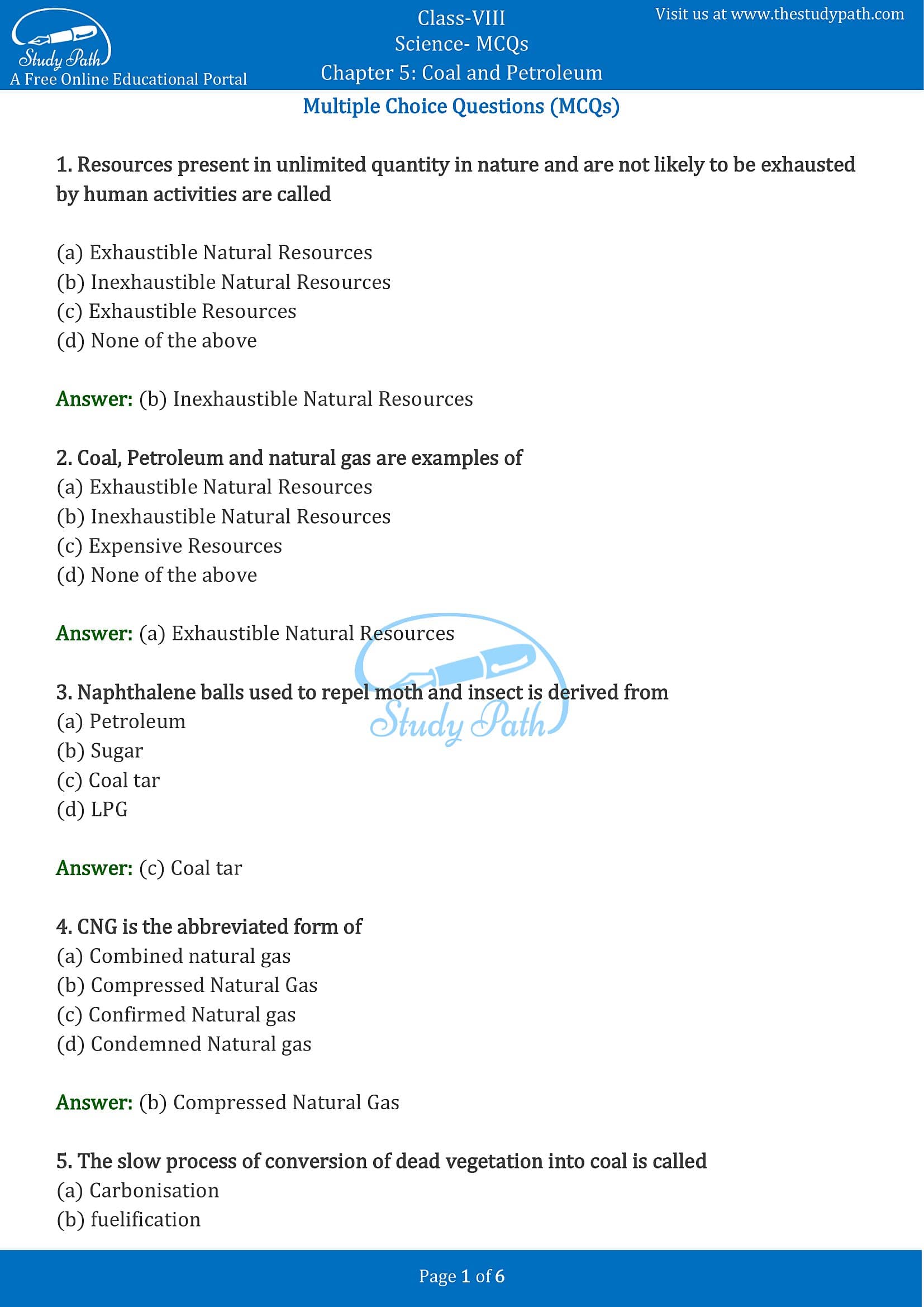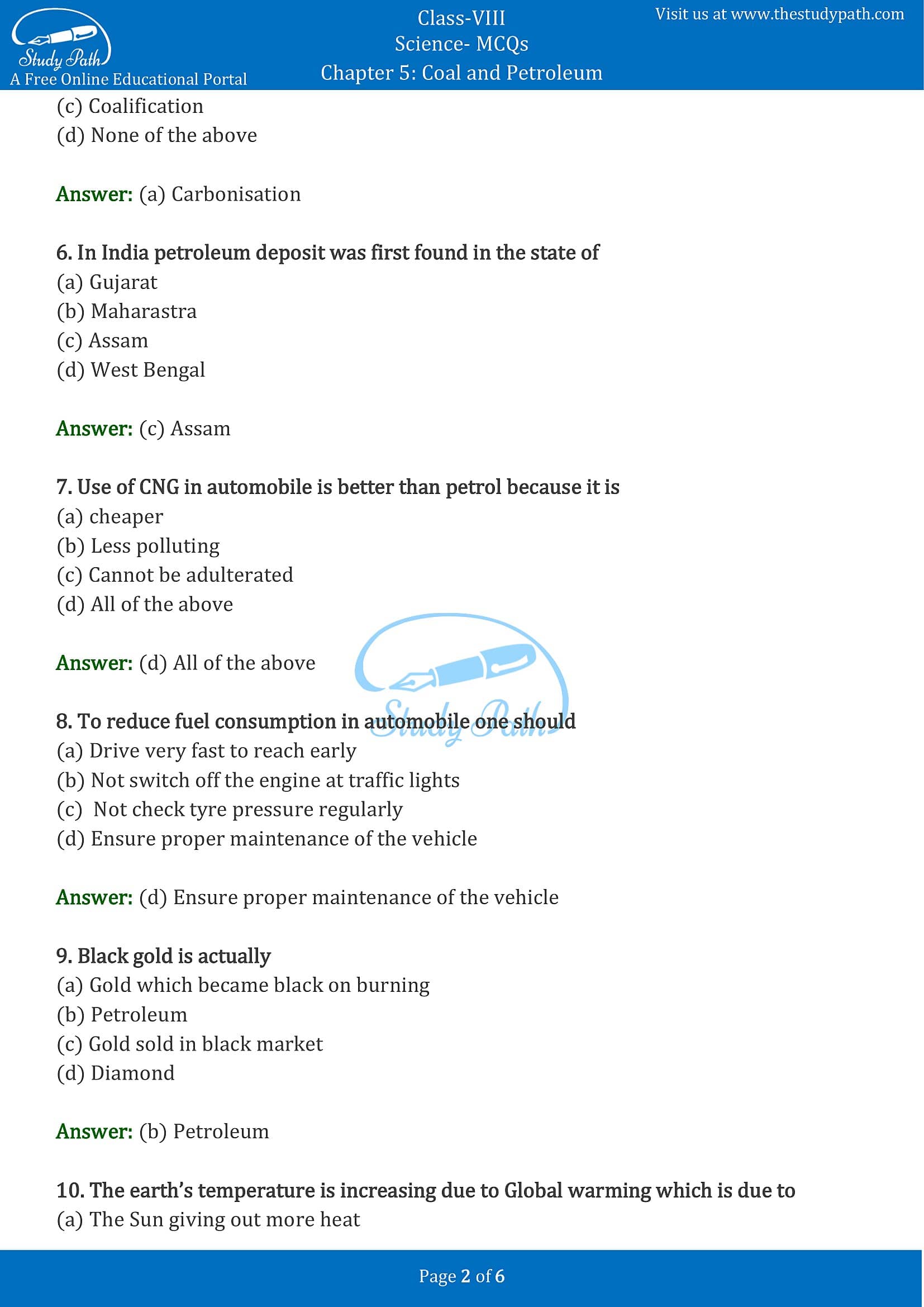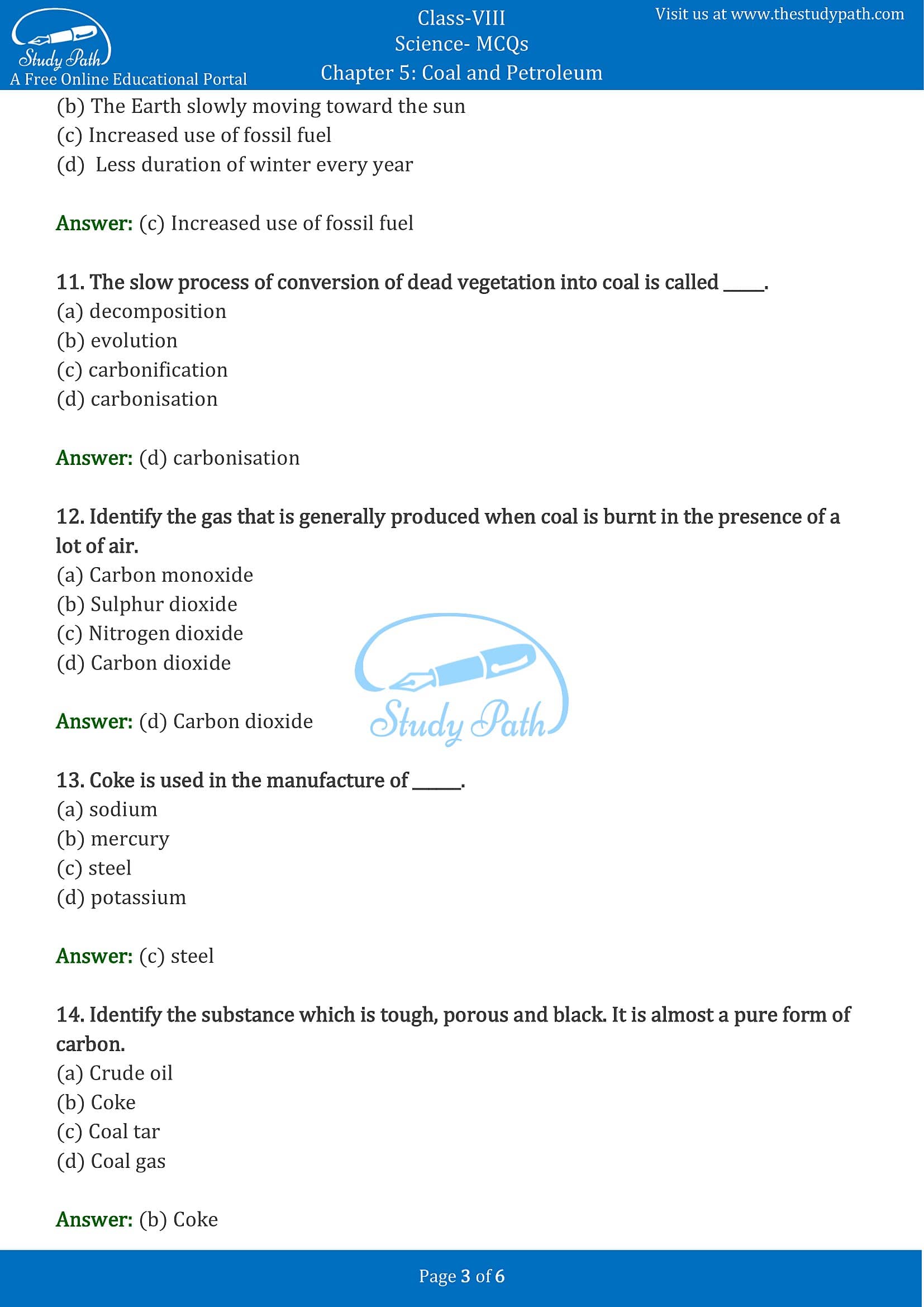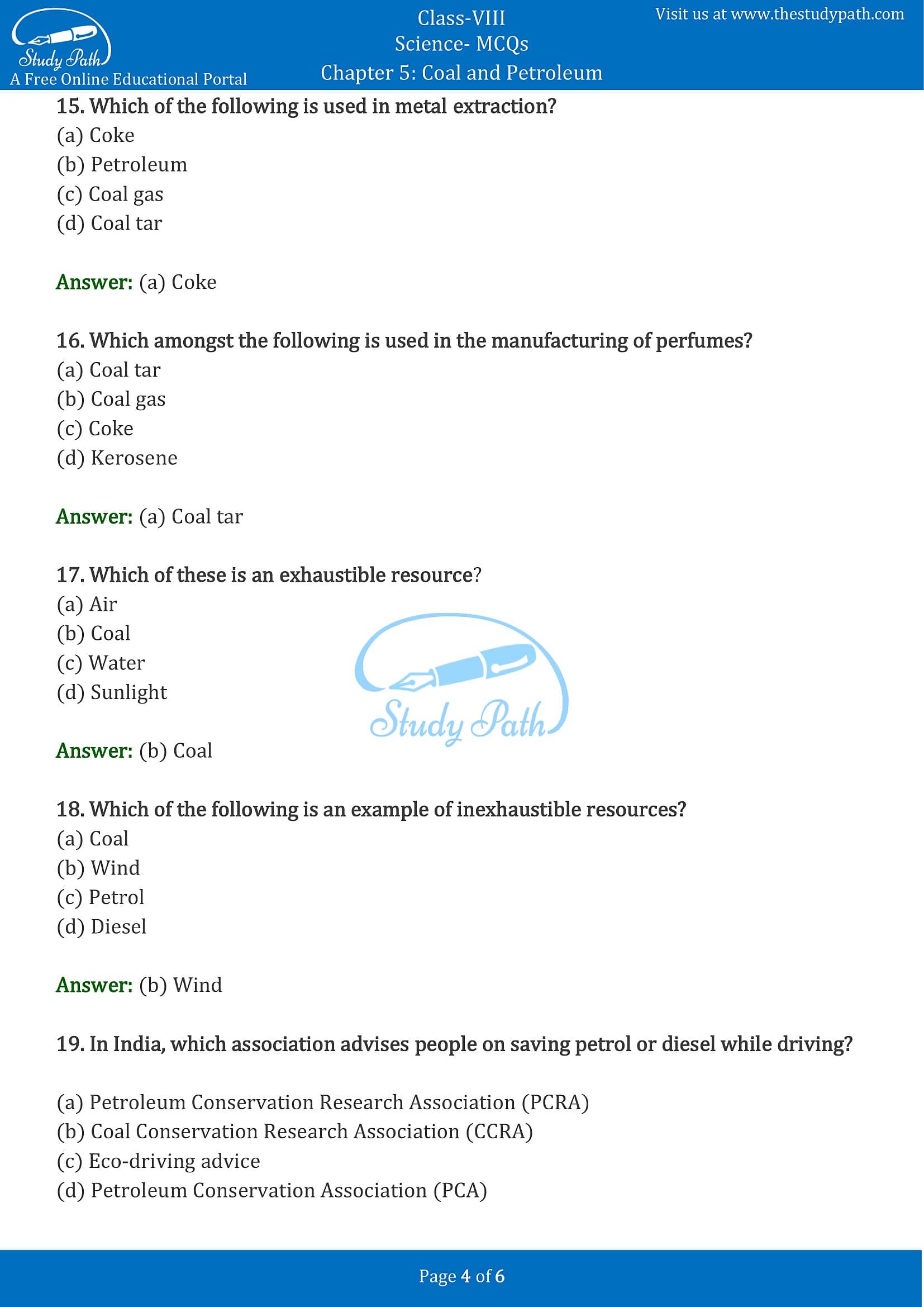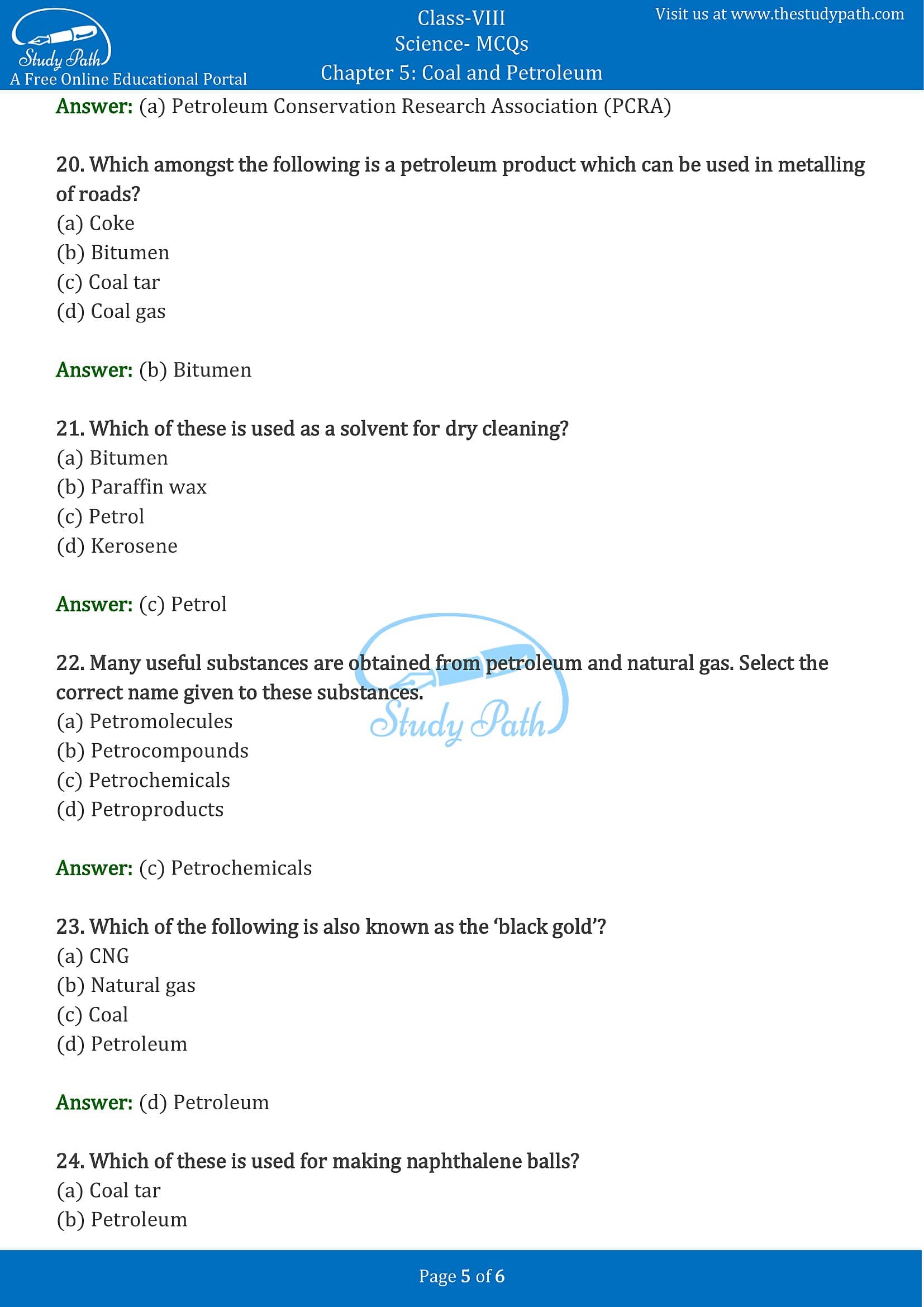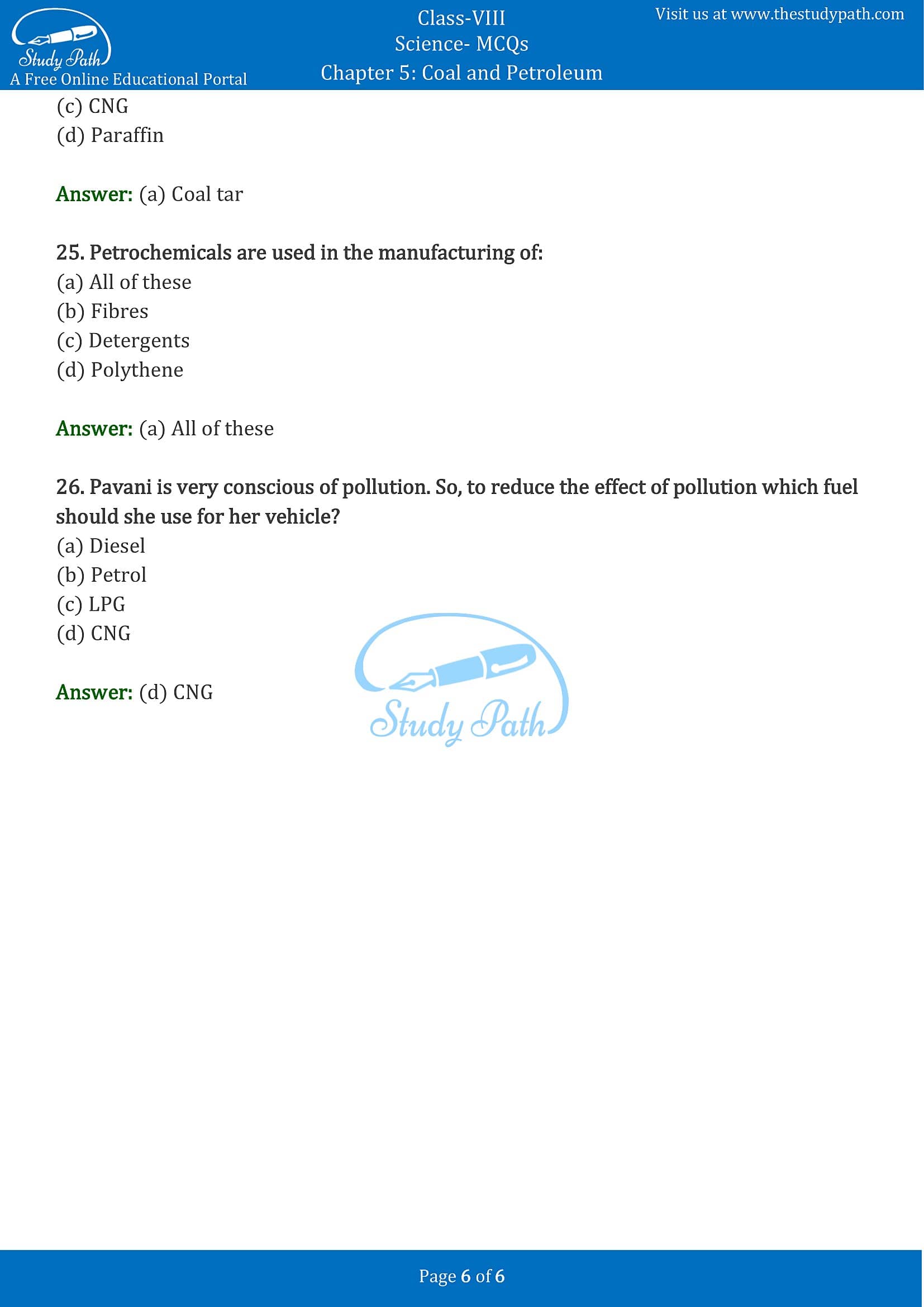Class 8 Science Chapter 5 Coal and Petroleum MCQ with Answers
Class 8 Science Chapter 5 Coal and Petroleum MCQ (Multiple Choice Questions) with Answers is available here in PDF format. CBSE Class 8 Science Coal and Petroleum Objective Questions helps the students to understand the concepts thoroughly and to score good marks. Practising these MCQs will help you to answer every question that is being asked in the exams.
At Study Path, you can download PDF of Multiple Choice Questions for Class 8 Science Coal and Petroleum with Answers. We prepared these MCQs on the basis latest exam Pattern. Students can solve these MCQs before the exam to know their preparation level.
Coal and Petroleum Class 8 MCQ with Answers
Multiple Choice Questions (MCQs)
1. Resources present in unlimited quantity in nature and are not likely to be exhausted by human activities are called
(a) Exhaustible Natural Resources
(b) Inexhaustible Natural Resources
(c) Exhaustible Resources
(d) None of the above
Answer: (b) Inexhaustible Natural Resources
2. Coal, Petroleum and natural gas are examples of
(a) Exhaustible Natural Resources
(b) Inexhaustible Natural Resources
(c) Expensive Resources
(d) None of the above
Answer: (a) Exhaustible Natural Resources
3. Naphthalene balls used to repel moth and insect is derived from
(a) Petroleum
(b) Sugar
(c) Coal tar
(d) LPG
Answer: (c) Coal tar
4. CNG is the abbreviated form of
(a) Combined natural gas
(b) Compressed Natural Gas
(c) Confirmed Natural gas
(d) Condemned Natural gas
Answer: (b) Compressed Natural Gas
5. The slow process of conversion of dead vegetation into coal is called
(a) Carbonisation
(b) fuelification
(c) Coalification
(d) None of the above
Answer: (a) Carbonisation
6. In India petroleum deposit was first found in the state of
(a) Gujarat
(b) Maharastra
(c) Assam
(d) West Bengal
Answer: (c) Assam
7. Use of CNG in automobile is better than petrol because it is
(a) cheaper
(b) Less polluting
(c) Cannot be adulterated
(d) All of the above
Answer: (d) All of the above
8. To reduce fuel consumption in automobile one should
(a) Drive very fast to reach early
(b) Not switch off the engine at traffic lights
(c) Not check tyre pressure regularly
(d) Ensure proper maintenance of the vehicle
Answer: (d) Ensure proper maintenance of the vehicle
9. Black gold is actually
(a) Gold which became black on burning
(b) Petroleum
(c) Gold sold in black market
(d) Diamond
Answer: (b) Petroleum
10. The earth’s temperature is increasing due to Global warming which is due to
(a) The Sun giving out more heat
(b) The Earth slowly moving toward the sun
(c) Increased use of fossil fuel
(d) Less duration of winter every year
Answer: (c) Increased use of fossil fuel
11. The slow process of conversion of dead vegetation into coal is called _____.
(a) decomposition
(b) evolution
(c) carbonification
(d) carbonisation
Answer: (d) carbonisation
12. Identify the gas that is generally produced when coal is burnt in the presence of a lot of air.
(a) Carbon monoxide
(b) Sulphur dioxide
(c) Nitrogen dioxide
(d) Carbon dioxide
Answer: (d) Carbon dioxide
13. Coke is used in the manufacture of ______.
(a) sodium
(b) mercury
(c) steel
(d) potassium
Answer: (c) steel
14. Identify the substance which is tough, porous and black. It is almost a pure form of carbon.
(a) Crude oil
(b) Coke
(c) Coal tar
(d) Coal gas
Answer: (b) Coke
15. Which of the following is used in metal extraction?
(a) Coke
(b) Petroleum
(c) Coal gas
(d) Coal tar
Answer: (a) Coke
16. Which amongst the following is used in the manufacturing of perfumes?
(a) Coal tar
(b) Coal gas
(c) Coke
(d) Kerosene
Answer: (a) Coal tar
17. Which of these is an exhaustible resource?
(a) Air
(b) Coal
(c) Water
(d) Sunlight
Answer: (b) Coal
18. Which of the following is an example of inexhaustible resources?
(a) Coal
(b) Wind
(c) Petrol
(d) Diesel
Answer: (b) Wind
19. In India, which association advises people on saving petrol or diesel while driving?
(a) Petroleum Conservation Research Association (PCRA)
(b) Coal Conservation Research Association (CCRA)
(c) Eco-driving advice
(d) Petroleum Conservation Association (PCA)
Answer: (a) Petroleum Conservation Research Association (PCRA)
20. Which amongst the following is a petroleum product which can be used in metalling of roads?
(a) Coke
(b) Bitumen
(c) Coal tar
(d) Coal gas
Answer: (b) Bitumen
21. Which of these is used as a solvent for dry cleaning?
(a) Bitumen
(b) Paraffin wax
(c) Petrol
(d) Kerosene
Answer: (c) Petrol
22. Many useful substances are obtained from petroleum and natural gas. Select the correct name given to these substances.
(a) Petromolecules
(b) Petrocompound
(c) Petrochemicals
(d) Petroproducts
Answer: (c) Petrochemicals
23. Which of the following is also known as the ‘black gold’?
(a) CNG
(b) Natural gas
(c) Coal
(d) Petroleum
Answer: (d) Petroleum
24. Which of these is used for making naphthalene balls?
(a) Coal tar
(b) Petroleum
(c) CNG
(d) Paraffin
Answer: (a) Coal tar
25. Petrochemicals are used in the manufacturing of:
(a) All of these
(b) Fibres
(c) Detergents
(d) Polythene
Answer: (a) All of these
26. Pavani is very conscious of pollution. So, to reduce the effect of pollution which fuel should she use for her vehicle?
(a) Diesel
(b) Petrol
(c) LPG
(d) CNG
Answer: (d) CNG
At Study Path, you can also learn more about science chapter 5 Coal and Petroleum by accessing the free exhaustive list of study materials and resources related to the chapter such as NCERT Solutions, Important Questions and Extra Questions.
